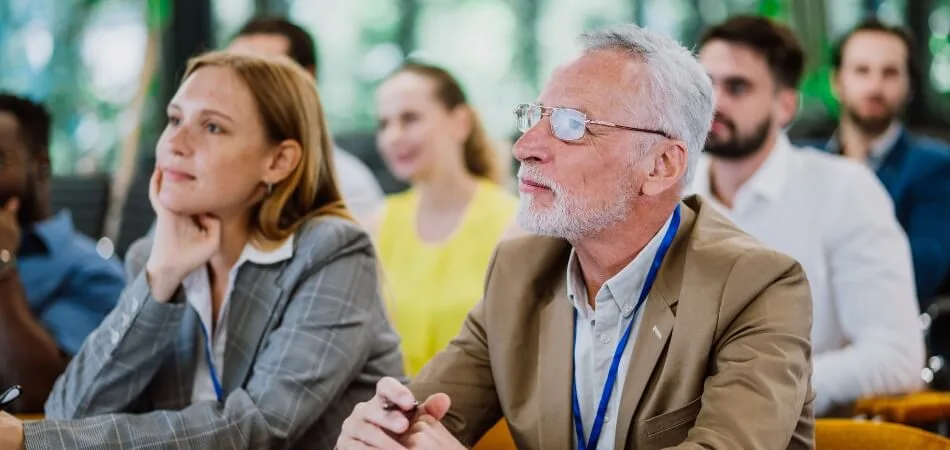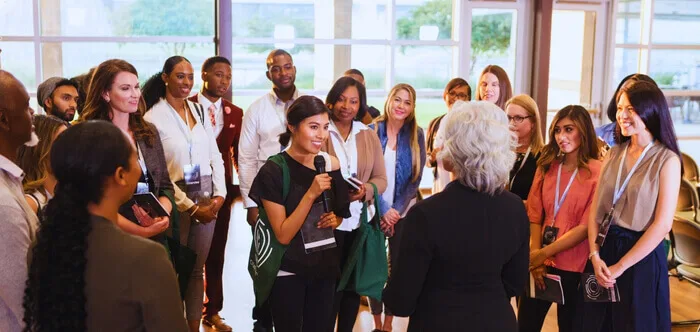In academic research, the role of a second author is often as crucial as that of the first. These individuals typically contribute significantly to the study, offering expertise, analysis, or critical revisions. A common query that arises in this context is: Do second authors go to conferences?
Yes, second authors often attend conferences, particularly when they have made significant contributions to the research. Their decision to participate is not just a matter of personal choice but also hinges on factors like the significance of the study, their specific role in it, and the availability of necessary resources, such as funding for travel and conference fees.
If you’re curious about the dynamics of conference attendance and the role of second authors, join us as we explore deeper into this topic in the following sections of our article.
Who are the Second Authors and What Role Do They Play?
Second authors in academic papers are typically collaborators who have made substantial contributions to the research. They often assist in data collection, analysis, or writing and revising the manuscript. Their role, while secondary in order of listing, is vital to the project’s success.
These individuals are not just assistants; they bring unique skills and perspectives to the table. Their expertise complements that of the lead author, enhancing the research’s depth and breadth. Second authors may also play a key role in presenting findings at conferences and seminars.
In academic conferences held globally, the position of a second author is regarded as a badge of honor and responsibility. It signifies a high level of involvement and expertise in the research process. Recognition as a second author indicates a significant intellectual contribution, rendering them indispensable to the overall impact of the research.
What are the Qualities of a Second Author?
The role of a second author in academic research is both prestigious and demanding. It requires a specific set of qualities that contribute significantly to the success of a project. Here are some key qualities that define an effective second author:
- Collaborative Spirit: A second author excels in teamwork, often bridging the gap between the lead author and other contributors. This ability to collaborate smoothly is crucial for the coherence and success of the research.
- Analytical Skills: They possess strong analytical abilities, essential for interpreting data and contributing to meaningful conclusions. Their insights often shape the direction and outcomes of the research.
- Detail-Oriented: Attention to detail is a hallmark of a good second author. They ensure that every aspect of the research is thoroughly checked and validated.
- Communication Skills: Effective communication, both in writing and verbally, is key. They often contribute to writing the paper and presenting the findings.
- Adaptability: The ability to adapt to changing scenarios and new information is vital. A second author is often the backbone of a project, keeping it on track amid shifts.
- Dedication: A high level of commitment to the project and its goals is expected. Their dedication is reflected in the time and effort they invest in the research.
The second author is not just a secondary participant but a key player in the research process. Their unique combination of skills and dedication plays a pivotal role in the success of academic aims.
Do Second Authors Go to Conferences?
Yes, second authors often attend conferences. They play a significant role in the research process and their presence at conferences is valuable for knowledge sharing and networking. Here are the factors that influence a second author’s participation in conferences.
Contribution to Research
- Second authors who have significantly contributed to research are more likely to attend conferences.
- Their deep involvement in the project makes them well-equipped to discuss and present the findings.
- They provide valuable insights during presentations and Q&A sessions.
- Their attendance helps in accurately representing the research work and its implications.
Study’s Importance
- The significance of the study often determines a second author’s presence at conferences.
- Groundbreaking or highly relevant research might necessitate their attendance for detailed discussions.
- They help in highlighting the study’s impact and potential applications in the field.
- For influential research, their presence can add credibility and depth to the presentation.
Availability of Resources
- The availability of funding and resources is a critical factor for conference attendance.
- Second authors need support for travel, accommodation, and conference registration fees.
- Institutions or grants often provide the necessary financial backing for such participation.
- Without adequate resources, even willing and important contributors might be unable to attend.
The decision for second authors to attend conferences is multifaceted, involving their contribution to the research, the study’s importance, and available resources. Their participation enriches the academic dialogue and fosters collaboration in the scholarly community.
What Motivates Second Authors to Attend Conferences?
In the academic view, conferences are not merely gatherings but pivotal platforms for growth, collaboration, and recognition. For second authors, these events offer a multitude of opportunities that go beyond just presenting research. Let’s see the diverse motivations that encourage second authors to attend these conferences.
Professional Networking
Second authors attend conferences to build connections with peers and experts in their field. This networking can lead to future collaborations and sharing of innovative ideas. It’s a chance for them to establish contacts that may aid in career advancement. Such interactions often open doors to new opportunities and collaborations.
Knowledge Exchange
Conferences are a hub for exchanging the latest developments and trends in various fields. Second authors gain valuable insights into new research methodologies and technologies. This exchange enriches their understanding and perspective, keeping them updated. The continual learning process is crucial for their professional growth.
Presentation Skills
Presenting at conferences is a key way for second authors to improve their public speaking and presentation skills. Feedback from these presentations helps them refine their communication abilities. This practice builds confidence and clarity in explaining their research. These skills are invaluable in their academic journey.
Recognition and Credibility
Participation in conferences can significantly enhance a second author’s status in the academic community. It allows them to showcase their work and contributions widely. This recognition boosts their credibility and reputation, motivating them and opening new career opportunities.
Collaborative Opportunities
Conferences often spark new ideas and lead to collaborative research projects. Second authors find these events perfect for initiating joint ventures with other academics. Collaboration leads to more comprehensive research outcomes and extends their professional network.
Personal Development
Personal growth is a key motivator for attending conferences. Exposure to diverse ideas and cultures broadens their horizons and challenges them. Stepping out of their comfort zone is crucial for their overall growth as researchers and individuals.
Second authors are motivated to attend conferences for a variety of reasons, including networking, knowledge exchange, skill enhancement, recognition, collaborative opportunities, and personal development. These factors collectively contribute to their professional journey and personal development in the academic world.
Typical Obstacles Second Authors May Face When Attending Conferences
Attending conferences is an important aspect of academic life, but it’s not without its challenges, especially for second authors. These authors often face unique obstacles that can hinder their ability to participate fully in these events. The ability to understand these barriers is crucial to both individuals and institutions.
- Financial Constraints: The cost of attending conferences can be prohibitive. Second authors may struggle to secure funding for travel, accommodation, and registration fees.
- Time Constraints: Balancing academic responsibilities with conference attendance is challenging. Time management becomes crucial, especially when juggling research, teaching, and personal commitments.
- Visibility Issues: As second authors, they might not receive the same level of recognition as primary authors. This reduced visibility can impact networking opportunities and professional growth.
- Collaboration Dynamics: It can be challenging to navigate the dynamics of authorship and collaboration. They may face challenges in representing the work equally and effectively.
- Preparation Pressure: The pressure to present well can be significant. Second authors often need to prepare extensively, which adds to their workload.
- Travel and Logistics: Planning and executing travel can be a daunting task. Issues with visas, flights, and accommodation can complicate conference attendance.
Recognizing and addressing these challenges is essential to support their active participation in these crucial academic forums.
Tips for Second Authors to Maximize Their Conference Experience
Conferences offer a wealth of opportunities for second authors, but maximizing the conference experience requires strategy and foresight. These events are not just about presenting research; they’re about learning, networking, and personal growth. To make the most of these opportunities, here are some practical tips for second authors.
Effective Networking
Networking is more than exchanging business cards. It’s about forming meaningful connections with peers and experts. Prioritize quality interactions over quantity, and don’t hesitate to introduce yourself. Remember, a well-timed conversation can open doors to future collaborations.
Active Participation
Don’t just be a spectator; engage actively in sessions and discussions. Ask questions, share insights, and contribute to debates. This active involvement not only enhances learning but also increases your visibility. It’s an opportunity to demonstrate your expertise and interest in the field.
Collaborative Opportunities
Look out for potential collaborators who share similar research interests. Discuss your work and explore possibilities of joint projects or research. Conferences are breeding grounds for future collaborations, so keep an open mind. Remember, a casual chat could evolve into a significant research partnership.
Skill Enhancement
Use the conference to improve skills like public speaking, networking, and critical analysis. Attend workshops or training sessions if available. These skills are invaluable and will serve you well beyond the conference. View every interaction as a chance to learn and grow.
Strategic Planning
Plan your conference schedule strategically. Prioritize sessions that align with your research interests and career goals. Balance your time between attending talks, networking, and exploring the exhibition areas. Efficient planning ensures you don’t miss out on valuable opportunities.
Post-Conference Follow-Up
The conference experience doesn’t end with the closing ceremony. Follow up with new contacts, send thank-you emails, and share relevant research or articles. This follow-up is crucial for maintaining the connections you’ve made. It helps turn brief encounters into lasting professional relationships.
Second authors can greatly enhance their conference experience and set themselves up for future success by strategically planning, actively participating, networking, seeking collaborations, improving skills, and following up after the conference.
Conclusion
Our discussion on second authors in academic research highlights their integral role, beyond just assisting in projects. They contribute significantly, bringing expertise and unique perspectives that are essential for the success of the research.
In answering do second authors go to conferences, it’s clear that their attendance is often driven by their substantial contributions to the research and the opportunities conferences offer for growth and collaboration. Despite facing challenges like financial constraints and visibility issues, their presence at these events is crucial for knowledge sharing and networking.
To maximize their experience, the second authors employ strategies such as effective networking, active participation, and strategic planning. By doing so, they turn these challenges into opportunities for professional development, enriching both their personal journey and the academic community as a whole.








